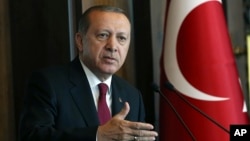Turkish President Recep Tayyip Erdogan has warned that his country will close its border with Iraqi Kurdistan as part of new sanctions following an independence vote by Iraqi Kurds earlier this month.
The announcement follows Erdogan's visit Wednesday to Tehran.
“All air spaces will be closed, the flights already are suspended. Who will come? How will you go? Soon, the borders also will be closed. How will you be able to exit and enter?" Erdogan said to a meeting in Ankara.
No timetable
The Turkish president said the planned new measures would be coordinated with Baghdad and Tehran, but he gave no timetable on their introduction other than saying it would be soon.
The Iraqi Kurdish independence referendum earlier this month, in which, Kurds voted more than 92 percent in favor, has been strongly condemned by Baghdad, Ankara and Tehran, all which claim that independence would create regional instability.
Ankara also fears Iraqi Kurdish independence would fuel secessionist demands from its own restive Kurdish minority. Erdogan claimed Thursday the Iraqi Kurdish independence was part of a wider conspiracy against his country.
“This encircling is not just limited to our physical borders,” Erdogan said. “I am talking about a bigger plot including our territory. We will spoil that plot as we have spoiled others, with God’s will and my nation’s strength.”
Ankara fears that Syrian Kurds on its border also have secessionist aspirations.
Kurds use Turkish pipeline
Erdogan on Thursday, while traveling back from Tehran, said a decision to ban Iraqi Kurdish energy exports would be coordinated with Tehran and Baghdad.
Iraqi Kurds export about a half-million barrels of oil daily through a Turkish pipeline to world markets, which provides crucial financial support.
If Ankara did close the pipeline, it could cause risk Moscow's displeasure, with a Russian oil company having major investments in Iraqi Kurdistan. But Erdogan appeared to play down such concerns, saying Russian President Vladimir Putin would be happy with an oil export embargo because it would increase oil prices.




